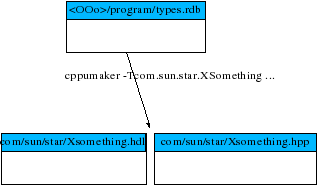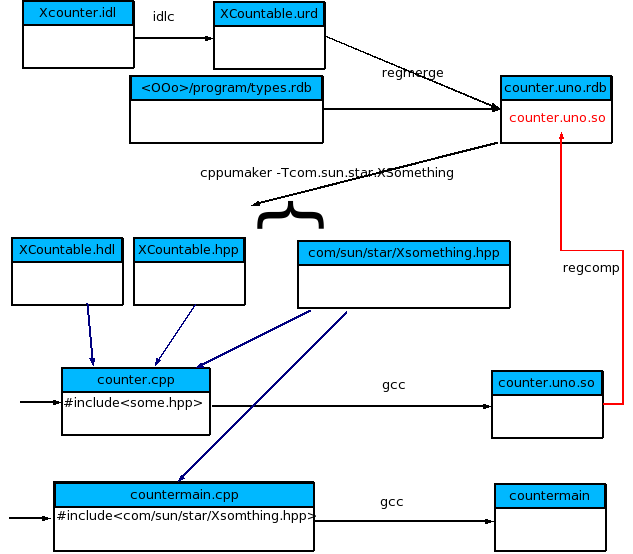MakeFile
Makefile structure
We will artificially divide the makefile in four parts :
- the setting part
- the compilation part
- the execute part
- the clean part
All makefiles provided with SDK have this structure. We can find very different compilation parts with each example provided. In this chapter we only discuss the setting part. If you have a look on the <OOSDK> directory you will see a « settings » directory. You have to use this directory if you want OS independent makefile. In general this is done with something like :
COMPONENT_NAME=ProfUnoLifetime DKREGISTRYNAME=/usr/lib/openoffice/program/types.rdb PRJ=../../../.. SETTINGS=$(PRJ)/settings include $(SETTINGS)/settings.mk include $(SETTINGS)/std.mk include $(SETTINGS)/dk.mk # Define non-platform/compiler specific settings COMPONENT_NAME=ProfUnoLifetime OUT_COMP_INC=$(OUT_INC)/$(COMPONENT_NAME) OUT_COMP_GEN=$(OUT_MISC)/$(COMPONENT_NAME) OUT_COMP_OBJ=$(OUT_OBJ)/$(COMPONENT_NAME) CXXFILES = ProfUnoLifetime.cxx OBJFILES = $(patsubst %.cxx,$(OUT_COMP_OBJ)/%.$(OBJ_EXT),$(CXXFILES))
The third line is directory-dependent : where your makefile lie and how do you reach the setting directory will change this line and the following, pointing toward the « settings » directory. Of course an other way is to use an absolute URL but portability is worse. The goal of other lines is to prepare compilation. We have let in red macros that seem not to be defined at first glance. But if you have a look to std.mk you will find the lacking definitions even if this files introduce other undefined macros which are in fact defined in settings.mk
Lifetime example: compilation part
The lifetime example is introduced in (page ). The file used to create this example is find in « <OOSDK>/examples/DevelopersGuide/ProfUNO/Lifetime ». The Lifetime directory contains a complicated makefile able of creating either a Java or a C++ example. We focus only on C++ code.
A shorter Makefile
We want to start from a shorter Makefile example than those given with SDK. For example the LifeTime example can be correctly compiled under Linux with this makefile :
# very simple makefile
CXXFILE = Test_Process.cxx
OBJFILE = Test_Process.o
OUTBIN = Test_Process
OUT_COMP_INC = ../../../../LINUXexample.out/inc/ProfUnoLifetime
OUT_COMP_OBJ = ../../../../LINUXexample.out/obj/ProfUnoLifetime
OUT_COMP_BIN = ../../../../LINUXexample.out/bin
CC_FLAGS = -c -O -fpic -fno-rtti
CC_DEFINES = -DUNX -DGCC -DLINUX -DCPPU_ENV=gcc3
PS = /
TYPES := \
com.sun.star.uno.XNamingService \
com.sun.star.uno.XComponentContext \
com.sun.star.uno.XWeak \
com.sun.star.uno.XAggregation \
com.sun.star.lang.XMain \
com.sun.star.lang.XMultiServiceFactory \
com.sun.star.lang.XSingleComponentFactory \
com.sun.star.lang.XTypeProvider \
com.sun.star.lang.XComponent \
com.sun.star.registry.XSimpleRegistry \
com.sun.star.registry.XImplementationRegistration \
com.sun.star.bridge.XBridgeFactory \
com.sun.star.bridge.XUnoUrlResolver \
com.sun.star.drawing.XDrawPage \
com.sun.star.container.XHierarchicalNameAccess
TYPESLIST = $(foreach t,$(TYPES),-T$(t))
GENHPPFILES = $(foreach t,$(TYPES),$(OUT_COMP_INC)/$(subst .,/,$(t)).hpp)
ALL : \
ProUNOLifetimeExamples
$(GENHPPFILES) : $(subst /,$(PS),$(@D))
mkdir -p $(OUT_COMP_INC)/$(subst /,$(PS),$(@D))
cppumaker -Gc -BUCR -O$(OUT_COMP_INC) $(TYPESLIST) "/usr/lib/openoffice/program/types.rdb"
$(OUT_COMP_OBJ)/$(OBJFILE) : $(CXXFILE) $(GENHPPFILES)
mkdir -p $(OUT_COMP_OBJ)/$(subst /,$(PS),$(@D))
gcc $(CC_FLAGS) $(CC_INCLUDES) -I. \
-I/usr/include -I../../../../LINUXexample.out/inc/examples \
-I../../../../include -I../../../../LINUXexample.out/inc/ProfUnoLifetime $(CC_DEFINES) \
-o$(OUT_COMP_OBJ)/$(OBJFILE) $(CXXFILE)
$(OUT_COMP_BIN)/$(OUTBIN) : $(OUT_COMP_OBJ)/$(OBJFILE)
mkdir -p $(OUT_COMP_BIN)
gcc -Wl -export-dynamic -L../../../../LINUXexample.out/lib -L../../../../linux/lib \
-L/usr/lib/openoffice/program -o$(OUT_COMP_BIN)/$(OUTBIN) \
$(OUT_COMP_OBJ)/$(OBJFILE) -lcppuhelpergcc3 -lcppu -lsalhelpergcc3 -lsal -lstlport_gcc
ProUNOLifetimeExamples : $(OUT_COMP_BIN)/$(OUTBIN)
@echo --------------------------------------------------------------------------------
@echo Please use one of the following commands to execute the examples!
@echo
@echo make ProfUnoLifetime.run
@echo --------------------------------------------------------------------------------
ProfUnoLifetime.run : $(OUT_COMP_BIN)/$(OUTBIN)
cd $(OUT_COMP_BIN) && $(OUTBIN)
This makefile is OS dependant. It only works under Linux. The makefiles provided with SDK are OS independent and then use more macros. We want now gives some details for each part of a makefile.
Header file generation
The Lifetime example
We begin with this example because it's the simplest example.
First Figure below demonstrates how to generate the required hdl and hpp files starting from a rdb file and idl files. You will probably easier understand the makefile if you know how works the cppumaker command. As an example we give :
$ cppumaker -Gc -BUCR some.idl <OOo>/program/types.rdb -OSomeWhere
The cppumaker documentation states
- -O<path> path describes the root directory for the generated output. The output directory tree is generated under this directory.
- -T<name> name specifies a type or a list of types. The output for this [t1;...] type is generated. If no '-T' option is specified, then output for all types is generated.
- -B<name> name specifies the base node.
- -Gc generate only target files whose content will be changed.
A question comes at first : how we know what hpp files are needed ? For the time being I can't answer this question in a general manner, but I hope to have partially answered in previous chapters. The corresponding makefile part which generates all of the hpp files is shown below :
COMPONENT_NAME=ProfUnoLifetime DKREGISTRYNAME=/usr/lib/openoffice/program/types.rdb PRJ=../../../.. SETTINGS=$(PRJ)/settings OUT_INC=$(PRJ)/LINUXexample.out/inc OUT_COMP_INC=$(OUT_INC)/$(COMPONENT_NAME) TYPES := \ com.sun.star.uno.XNamingService \ com.sun.star.uno.XComponentContext \ com.sun.star.uno.XWeak \ com.sun.star.uno.XAggregation \ com.sun.star.lang.XMain \ com.sun.star.lang.XMultiServiceFactory \ com.sun.star.lang.XSingleComponentFactory \ com.sun.star.lang.XTypeProvider \ com.sun.star.lang.XComponent \ com.sun.star.registry.XSimpleRegistry \ com.sun.star.registry.XImplementationRegistration \ com.sun.star.bridge.XBridgeFactory \ com.sun.star.bridge.XUnoUrlResolver \ com.sun.star.container.XHierarchicalNameAccess TYPESLIST = $(foreach t,$(TYPES),-T$(t)) GENHPPFILES = $(foreach t,$(TYPES),$(OUT_COMP_INC)/$(subst .,/,$(t)).hpp) # Targets .PHONY: ALL ALL : ProUNOLifetimeExample include $(SETTINGS)/stdtarget.mk $(GENHPPFILES) : -$(MKDIR) $(subst /,$(PS),$(@D)) cppumaker -Gc -BUCR -O$(OUT_COMP_INC) $(TYPESLIST) $(DKREGISTRYNAME)
Again MKDIR and PS indicates macros that seem to be undefined but they are defined in settings.mk file.
An other way to construct header files is to use a makefile and an other tool : xml2cmp. You can find an example in <OpenOffice.org1.1_SDK>/examples/cpp/remoteclient directory.
A more sophisticated example
The hpp construction is not always so easy. This can occur every time you have a component (in the sense of chapter 13). The problem in this case is the cppumaker tool is unable to generate a hpp file if its corresponding interface not registered.
As you can see in Figure 1.2 you have to use idlc to create an urd file. This file and the types.rdb files are used to create a rdb file with regmerge. After and only after cppumaker is able to generate the hpp file corresponding to the starting IDL file. A complete example is given in the makefile in . We give here what is done in a shell under Linux to see this construction in action :
mkdir -p ../../../LINUXexample.out/misc/counter idlc -I. -I../../../idl -O../../../LINUXexample.out/misc/counter XCountable.idl idlc: compile 'XCountable.idl' ... idlc: returned successful Sun Microsystems (R) idlc Version 1.0 mkdir -p ../../../LINUXexample.out/bin rm -f ../../../LINUXexample.out/bin/counter.uno.rdb regmerge ../../../LINUXexample.out/bin/counter.uno.rdb /UCR ../../../LINUXexample.out/misc/counter/XCountable.urd regmerge ../../../LINUXexample.out/bin/counter.uno.rdb / "/usr/lib/openoffice/program/types.rdb" mkdir -p ../../../LINUXexample.out/misc rm -f ../../../LINUXexample.out/misc/cpp_counter_types.flag cppumaker -Gc -BUCR -O../../../LINUXexample.out/inc/counter ../../../LINUXexample.out/bin/counter.uno.rdb echo flagged > ../../../LINUXexample.out/misc/cpp_counter_types.flag Here is the makefile corresponding part : .... $(OUT_COMP_GEN)/%.urd : %.idl -$(MKDIR) $(subst /,$(PS),$(@D)) idlc -I. -I$(IDL_DIR) -O$(OUT_COMP_GEN) $< # This example type library will be extended by the office types $(OUT_BIN)/%.rdb : $(GENURDFILES) -$(MKDIR) $(subst /,$(PS),$(@D)) -$(DEL) $(subst /,$(PS),$@) regmerge $@ /UCR $(GENURDFILES) regmerge $@ / $(DKREGISTRYNAME) $(COMPONENT_TYPEFLAG) : $(COMPONENT_RDB) $(COMPONENT_XML) -$(MKDIR) $(subst /,$(PS),$(@D)) -$(DEL) $(subst /,$(PS),$(COMPONENT_TYPEFLAG)) cppumaker -Gc -BUCR -O$(OUT_COMP_INC) $(TYPESLIST) $(COMPONENT_RDB) echo flagged > $@ .....
You are now ready to use gcc to compile your code.
Compiling with gcc
The compilation is achieved in two steps or more steps depending how many files we have to compile. The way is making object files first and then linking.
A two step compilation example
We give first a two step compilation example. You can find such example in
<OpenOffice.org1.1_SDK>/examples/DevelopersGuide/ProfUNO/CppBinding
or
<OpenOffice.org1.1_SDK>/examples/DevelopersGuide/ProfUNO/Lifetime
and probably elsewhere.
$(OUT_COMP_OBJ)/%.$(OBJ_EXT) : %.cxx $(GENHPPFILES) -$(MKDIR) $(subst /,$(PS),$(@D)) $(CC) $(CC_FLAGS) $(CC_INCLUDES) -I$(OUT_COMP_INC) $(CC_DEFINES) $(CC_OUTPUT_SWITCH)$(subst /,$(PS),$@) $< $(OUT_BIN)/%$(EXE_EXT) : $(OBJFILES) -$(MKDIR) $(subst /,$(PS),$(@D)) -$(MKDIR) $(subst /,$(PS),$(OUT_COMP_GEN)) ifeq "$(OS)" "WIN" $(LINK) $(EXE_LINK_FLAGS) /OUT:$@ /MAP:$(OUT_COMP_GEN)/$(subst $(EXE_EXT),.map,$(@F)) \ $(OBJFILES) $(CPPUHELPERLIB) $(CPPULIB) $(SALHELPERLIB) $(SALLIB) $(STLPORTLIB) else $(LINK) $(EXE_LINK_FLAGS) $(LINK_LIBS) -o $@ $(OBJFILES) \ $(CPPUHELPERLIB) $(CPPULIB) $(SALHELPERLIB) $(SALLIB) $(STLPORTLIB) $(STDC++LIB) endif
We don't use red color because again all is defined : CPPUHELPERLIB .... in settings.mk
As you can see linking is done with a lot of library : cppuhelperlib, cppulib, salhelperlib ... I want to mention here that in the Lifetime example I have removed all libraries but keeped cppuhelperlib and this example works properly.
A three step compilation example
If you want to use helper as mentioned in Reflection helper, you have to manage such construction. We give a part of an other short makefile used to compile a binary with an helper :
$(OUT_COMP_OBJ)/$(OBJFILE) : $(CXXFILE) $(GENHPPFILES) $(HELPER).hpp -mkdir -p $(subst /,$(PS),$(@D)) gcc $(CC_FLAGS) $(CC_INCLUDES) -I. -I/usr/include -I$(OUT_COMP_INC)/examples \ -I../../../../include -I$(OUT_COMP_INC) $(CC_DEFINES) -o$(OUT_COMP_OBJ)/$(OBJFILE) $(CXXFILE) $(OUT_COMP_OBJ)/$(HELPER).o : $(HELPER).cxx $(HELPER).hpp -mkdir -p $(OUT_COMP_OBJ)/ gcc $(CC_FLAGS) $(CC_INCLUDES) -I. -I/usr/include -I$(OUT_COMP_INC)/examples \ -I../../../../include -I$(OUT_COMP_INC) $(CC_DEFINES) -o$(OUT_COMP_OBJ)/$(HELPER).o $(HELPER).cxx $(OUT_COMP_BIN)/$(OUTBIN) : $(OUT_COMP_OBJ)/$(OBJFILE) $(OUT_COMP_OBJ)/$(HELPER).o -mkdir -p $(OUT_COMP_BIN) gcc -Wl -export-dynamic -L../../../../LINUXexample.out/lib -L../../../../linux/lib \ -L/usr/lib/openoffice/program $(OUT_COMP_OBJ)/$(HELPER).o \ -o$(OUT_COMP_BIN)/$(OUTBIN) $(OUT_COMP_OBJ)/$(OBJFILE) -lcppuhelpergcc3 -lcppu \ -lsalhelpergcc3 -lsal -lstlport_gcc
where we see a first compilation of all cxx files into object files and a link (with gcc). The complete makefile is given in chapter 12 (see). Note that this makefile is OS dependant and works only on Linux systems. Here is what you see in a shell when using this kind of MakeFile :
gcc -c -O -fpic -fno-rtti -I. -I/usr/include -I../../../../LINUXexample.out/inc/examples \ -I../../../../include -I../../../../LINUXexample.out/inc -DUNX -DGCC -DLINUX -DCPPU_ENV=gcc3 -o../../../../LINUXexample.out/obj/office_connect.o office_connect.cxx mkdir -p ../../../../LINUXexample.out/obj/ gcc -c -O -fpic -fno-rtti -I. -I/usr/include -I../../../../LINUXexample.out/inc/examples \ -I../../../../include -I../../../../LINUXexample.out/inc -DUNX -DGCC -DLINUX -DCPPU_ENV=gcc3 -o../../../../LINUXexample.out/obj/ReflectionHelper.o ReflectionHelper.cxx mkdir -p ../../../../LINUXexample.out/bin gcc -Wl -export-dynamic -L../../../../LINUXexample.out/lib -L../../../../linux/lib -L/usr/lib/openoffice/program \ ../../../../LINUXexample.out/obj/ReflectionHelper.o \ -o../../../../LINUXexample.out/bin/office_connect ../../../../LINUXexample.out/obj/office_connect.o -lcppuhelpergcc3 -lcppu -lsalhelpergcc3 -lsal -lstlport_gcc
A four step compilation example
We encounter a four step example in <OpenOffice.org1.1_SDK>/examples/cpp/counter where two cxx files are compiled. The first counter.cxx is compiled first as conter.o and second as counter.uno.so and the second file countermain.cxx is compiled as countermain.o and then as countermain, a binary executable file. The Figure below shows us what is new in this makefile : constructing a dynamic library.
Here we give the makefile example :
.... COMPONENT_NAME=counter COMPONENT_IMPL_NAME=$(COMPONENT_NAME).uno.$(SHAREDLIB_EXT) COMPONENT_IMPL=$(SHAREDLIB_OUT)/$(COMPONENT_IMPL_NAME) COMPONENT_RDB_NAME = $(COMPONENT_NAME).uno.rdb COMPONENT_RDB = $(OUT_BIN)/$(COMPONENT_RDB_NAME) ..... ifeq "$(OS)" "WIN" $(SHAREDLIB_OUT)/%.$(SHAREDLIB_EXT) : $(SLOFILES) $(OUT_COMP_GEN)/%.def -$(MKDIR) $(subst /,$(PS),$(@D)) -$(MKDIR) $(subst /,$(PS),$(OUT_COMP_GEN)) $(LINK) $(LIBRARY_LINK_FLAGS) /OUT:$@ /MAP:$(OUT_COMP_GEN)/$(subst $(SHAREDLIB_EXT),map,$(@F)) \ /DEF:$(OUT_COMP_GEN)/$(subst $(SHAREDLIB_EXT),def,$(@F)) $(SLOFILES) \ $(CPPUHELPERLIB) $(CPPULIB) $(SALLIB) $(STLPORTLIB) msvcrt.lib kernel32.lib else $(SHAREDLIB_OUT)/%.$(SHAREDLIB_EXT) : $(SLOFILES) -$(MKDIR) $(subst /,$(PS),$(@D)) $(LINK) $(LIBRARY_LINK_FLAGS) $(LINK_LIBS) -o $@ $^\ $(CPPUHELPERLIB) $(CPPULIB) $(SALLIB) $(STLPORTLIB) $(STC++LIB) endif
Perhaps is it more easy to understand with showing what happens with this makefile part under Linux :
gcc -c -O -fpic -fno-rtti -I. -I/usr/include -I../../../LINUXexample.out/inc/examples -I../../../include -I../../../LINUXexample.out/inc/counter -DUNX -DGCC -DLINUX -DCPPU_ENV=gcc3 -o../../../LINUXexample.out/slo/counter/counter.o counter.cxx mkdir -p ../../../LINUXexample.out/lib gcc -shared '-Wl,-rpath,$ORIGIN' -L../../../LINUXexample.out/lib -L../../../linux/lib -L/usr/lib/openoffice/program -o ../../../LINUXexample.out/lib/counter.uno.so ../../../LINUXexample.out/slo/counter/counter.o\ -lcppuhelpergcc3 -lcppu -lsal -lstlport_gcc
We want to show now other parts of the makefile.

